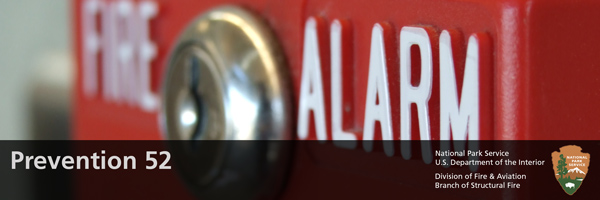
Smoke Alarms. Smoke Detectors. Fire Alarms.
All of these are terms for devices and systems at work and home to alert you of a fire. Smoke alarms and smoke detectors are typically found in homes and sense smoke and activate with a piercing sound designed to wake you and your family up so you can get out of your house. Fire alarms, typically found at work, are a system of devices such as smoke detectors, manual pull stations, and output devices such as horns and strobe lights for the deaf, all connected to a control panel that can alert the fire department.
In October 2012, a fire broke out in a historic structure at Minuteman National Historic Park in Concord, Massachusetts. Occupants of the building, both employees and visitors, were alerted by a smoke detector and evacuated without injury, while the alarm system activated the local fire department and sprinkler system. Thanks to proper design and maintenance, this fire emergency had a safe outcome.
In housing units, people often disable smoke detectors by covering the detector, removing the battery, or removing the detector because of too many false alarms. This often happens because smoke alarms are dirty with dust or cobwebs, or because they are placed too close to cooking smoke or shower steam.
These systems are the first line of defense for our buildings and their contents. Properly installing, testing, and maintaining fire and smoke alarms will ensure that occupants are notified of a fire.
Fire Info for You
Employees
- See a video on smoke alarms.
- Deaf or hard of hearing? Read this.
Park Leadership
- Superintendents: Did you know data collected through fire and life safety building inspections in NPS buildings show that over 12% of our buildings where people sleep have no smoke detection?
Regional/National Leadership
Did you know that 41 CFR 102-80.90 is the law for all federal agencies on safety and fire prevention? Read about your responsibilities here.
Take Action
- Find out if your building has a fire alarm. If it does, does it work? Ask your facility manager when the alarm was last tested. No fire alarm? Now is always a good time to talk with your coworkers about how you are going to notify the rest of the building and the fire department if there is a fire.
- Take it home - Make sure that you have working smoke detectors on every floor of your house and in every bedroom.
- If your smoke alarms/detectors are covered in dust or cobwebs, clean them with a vacuum cleaner.
NPS Fire Facts
The NPS Structural Fire Branch conducts fire and life safety building inspections to determine compliance with fire codes, and we've noticed some trends:
- Some NPS buildings lack required inspection, testing, and maintenance of fire suppression systems.
- Many battery-operated smoke detectors have had the battery removed.
- Many NPS housing units do not have or have improperly installed smoke alarms.
Last updated: December 1, 2016
